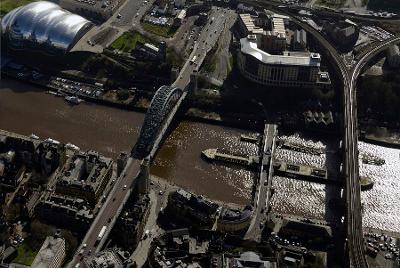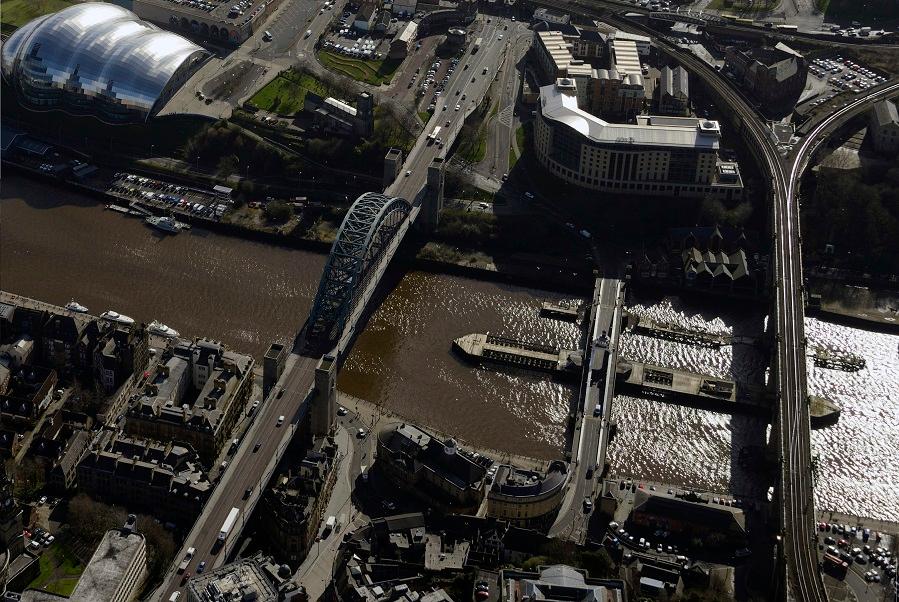Councils set out Clean Air Zone launch proposals

Proposals for a phased introduction of Newcastle and Gateshead's Clean Air Zone have been approved by councillors from both authorities.
The proposals would see the Clean Air Zone (CAZ) brought into operation later this year, with drivers of non-compliant vehicles entering the zone being sent warning letters, along with details about financial support, from November.
Subject to government approval, charges for non-compliant taxis, buses and HGVs will begin from 30 January 2023.
Again, subject to government approval, non-compliant vans would not face charges to enter the CAZ until July 2023. The proposal to defer these charges is in response to the national LGV supply shortage which is affecting the ability of small businesses to upgrade their vehicles.
Allowing this additional time would still enable compliance with air quality targets to be achieved in 2023 - the earliest possible compliance date following government approval of the councils' final business case in March this year - while also giving van drivers more opportunity to obtain grant funding and source replacement vehicles prior to facing CAZ charges.
Private cars and motorbikes, as well as vehicles that meet national CAZ emissions standards, will not be charged for entering the zone.
The proposed timeline for introducing the CAZ was set out in Cabinet reports for Gateshead and Newcastle councils.
Proposals for the phased launch have also been submitted to government and councils are awaiting confirmation of ministerial approval.
Councillor John McElroy, cabinet member for the environment and transport at Gateshead Council added:
"Our main concern is to improve air quality and a huge amount of work on behalf of councils and government has been focused on transport changes that promote more active and sustainable ways of getting around.
"For vehicle owners, we have to be fair on the timetable for introducing charges.
"Van drivers elsewhere in the country have faced difficulties around purchasing newer vehicles that would meet the national CAZ emissions standards.
"Supply shortages mean it's not only harder to find a suitable vehicle, it's also much more costly to buy one.
"It's clear that these drivers and small businesses need additional time to get CAZ compliant and therefore we are seeking to defer charges for these vehicles to be fair to the affected van drivers and business owners."
Councillor Jane Byrne, cabinet member for connected city at Newcastle City Council, said: "Improving air quality is a big priority as this has such a significant impact on everyone's health.
"We have a legal order from government which means we have to introduce the Clean Air Zone in order to achieve this improvement, but we also need to recognise the potential impact this could have on local businesses and ensure they have support.
"By introducing charging on a phased basis we would be able to give businesses more opportunity to prepare while still achieving air quality compliance in 2023."
Cabinet members have also backed further support measures, including additional exemptions for a small number of vehicles such as rail replacement buses and coaches, bus and HGV driver training vehicles, breakdown recovery vehicles, hybrid vehicles and taxis and vans belonging to people living within the CAZ area.
Grant funding for drivers looking to replace or upgrade non-compliant vehicles has been provided by government and will be made available later this year, along with wider finance packages to cover purchase costs.
A total of £18.2m of grant funding for taxi, van and HGV upgrades will be offered and the two councils are appointing a finance provider to help manage and distribute these funds. A separate fund of £1.7m will be administered directly by the councils for bus operators.
Drivers who are in the process of accessing funding and upgrading their vehicle may be entitled to a temporary exemption while they wait for their upgrade to be completed.
Further information about the grants and exemption processes will be published when details are finalised.
The CAZ will cover most of Newcastle city centre, as well as the Tyne, Swing, High Level and Redheugh bridges, and will affect taxis, vans, buses and HGVs that do not meet national CAZ emissions standards. Private cars are exempt.
Check if your vehicle is compliant with the CAZ emissions standards (opens new window)

Proposals for a phased introduction of Newcastle and Gateshead's Clean Air Zone have been approved by councillors from both authorities.
The proposals would see the Clean Air Zone (CAZ) brought into operation later this year, with drivers of non-compliant vehicles entering the zone being sent warning letters, along with details about financial support, from November.
Subject to government approval, charges for non-compliant taxis, buses and HGVs will begin from 30 January 2023.
Again, subject to government approval, non-compliant vans would not face charges to enter the CAZ until July 2023. The proposal to defer these charges is in response to the national LGV supply shortage which is affecting the ability of small businesses to upgrade their vehicles.
Allowing this additional time would still enable compliance with air quality targets to be achieved in 2023 - the earliest possible compliance date following government approval of the councils' final business case in March this year - while also giving van drivers more opportunity to obtain grant funding and source replacement vehicles prior to facing CAZ charges.
Private cars and motorbikes, as well as vehicles that meet national CAZ emissions standards, will not be charged for entering the zone.
The proposed timeline for introducing the CAZ was set out in Cabinet reports for Gateshead and Newcastle councils.
Proposals for the phased launch have also been submitted to government and councils are awaiting confirmation of ministerial approval.
Councillor John McElroy, cabinet member for the environment and transport at Gateshead Council added:
"Our main concern is to improve air quality and a huge amount of work on behalf of councils and government has been focused on transport changes that promote more active and sustainable ways of getting around.
"For vehicle owners, we have to be fair on the timetable for introducing charges.
"Van drivers elsewhere in the country have faced difficulties around purchasing newer vehicles that would meet the national CAZ emissions standards.
"Supply shortages mean it's not only harder to find a suitable vehicle, it's also much more costly to buy one.
"It's clear that these drivers and small businesses need additional time to get CAZ compliant and therefore we are seeking to defer charges for these vehicles to be fair to the affected van drivers and business owners."
Councillor Jane Byrne, cabinet member for connected city at Newcastle City Council, said: "Improving air quality is a big priority as this has such a significant impact on everyone's health.
"We have a legal order from government which means we have to introduce the Clean Air Zone in order to achieve this improvement, but we also need to recognise the potential impact this could have on local businesses and ensure they have support.
"By introducing charging on a phased basis we would be able to give businesses more opportunity to prepare while still achieving air quality compliance in 2023."
Cabinet members have also backed further support measures, including additional exemptions for a small number of vehicles such as rail replacement buses and coaches, bus and HGV driver training vehicles, breakdown recovery vehicles, hybrid vehicles and taxis and vans belonging to people living within the CAZ area.
Grant funding for drivers looking to replace or upgrade non-compliant vehicles has been provided by government and will be made available later this year, along with wider finance packages to cover purchase costs.
A total of £18.2m of grant funding for taxi, van and HGV upgrades will be offered and the two councils are appointing a finance provider to help manage and distribute these funds. A separate fund of £1.7m will be administered directly by the councils for bus operators.
Drivers who are in the process of accessing funding and upgrading their vehicle may be entitled to a temporary exemption while they wait for their upgrade to be completed.
Further information about the grants and exemption processes will be published when details are finalised.
The CAZ will cover most of Newcastle city centre, as well as the Tyne, Swing, High Level and Redheugh bridges, and will affect taxis, vans, buses and HGVs that do not meet national CAZ emissions standards. Private cars are exempt.
Check if your vehicle is compliant with the CAZ emissions standards (opens new window)
